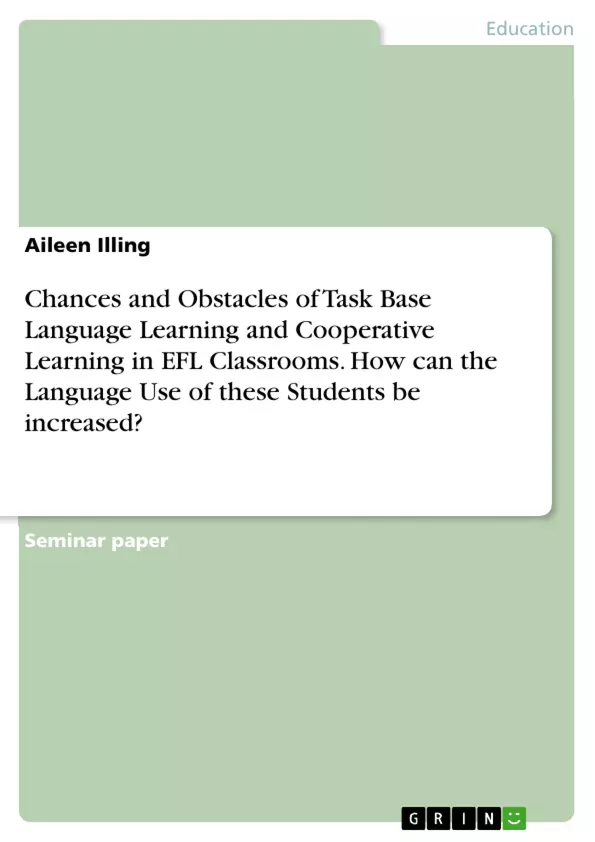Nowadays, through the shift towards Communicative Language Teaching (CLT), which appeared in the 1990s, and the approach of Task Base Language Learning (TBLL), which was developed out of CLT, the importance of using the target language in order to acquire it is emphasized.
Although this opinion is very popular, some teachers are not able to increase the Student Talking Time (STT) in their EFL classrooms. Therefore, this paper focuses on the question how the approach of TBLL and the concept of cooperative learning can help the teachers to increase the STT in secondary EFL classrooms and scaffold the acquisition of communicative competence of their students.
In order to do so, this paper first of all explains some important theories regarding second and foreign language acquisition and points out what is meant by the term of communicative competence. After that, this paper offers an overview about the characteristics of TBLL and why this methodology can be used in order to give the students more chances to use the target language in EFL classrooms.
This paper will also discuss the chances and obstacles of group work as one possible method of cooperative learning which can foster oral participation. It will also explain what teachers should consider in order to use this approach efficiently. Before the results are summed up at the end of this paper, a concrete teaching sequence is suggested.
Inhaltsverzeichnis (Table of Contents)
- Introduction
- Research and theories regarding second and foreign language acquisition
- Communicative competence and strategies
- The methodology of TBLL: a shift towards communicative language teaching
- What is a task?
- The shifted role of the teachers
- The concept of group work as an example for cooperative learning in the communicative language teaching
- Chances and obstacles of group work
- The division of students into suitable groups
- Role plays: a concrete example of communicative group work in EFL classrooms
- Conclusion
Zielsetzung und Themenschwerpunkte (Objectives and Key Themes)
This paper aims to explore the potential of Task-Based Language Learning (TBLL) and cooperative learning to increase student talking time (STT) in secondary EFL classrooms and foster communicative competence. It examines how these approaches can help teachers scaffold the acquisition of communicative competence in students.
- Theories of second and foreign language acquisition
- Communicative competence and its components
- The methodology of TBLL and its application in EFL classrooms
- The benefits and challenges of cooperative learning, specifically group work
- The design and implementation of communicative group work activities
Zusammenfassung der Kapitel (Chapter Summaries)
- Introduction: This chapter introduces the focus of the paper, highlighting the importance of communicative competence in EFL education. It discusses the shift from traditional grammar-focused teaching to communicative language teaching (CLT) and the role of TBLL in fostering this approach.
- Research and Theories: This chapter examines key theories of second and foreign language acquisition, tracing the evolution from behaviorism to interactionist models. It highlights the changing emphasis on input, output, and interaction in language learning.
- Communicative Competence and Strategies: This chapter defines communicative competence, expanding on Chomsky's concept to include pragmatic knowledge and the use of communicative strategies. It emphasizes the importance of acquiring this competence for successful communication.
- The Methodology of TBLL: This chapter explores the characteristics of TBLL, emphasizing its focus on using the target language in authentic tasks. It discusses the role of the teacher in this approach, which shifts from being the primary source of information to a facilitator of learning.
- The Concept of Group Work: This chapter examines group work as a method of cooperative learning, highlighting its potential to increase STT and foster communicative competence. It also discusses the challenges of group work and the importance of careful group formation.
- Role Plays: This chapter presents role plays as a concrete example of communicative group work in EFL classrooms. It explores the design and implementation of role-playing activities to encourage communicative language teaching.
Schlüsselwörter (Keywords)
This paper focuses on key concepts and themes related to second language acquisition, communicative language teaching, and fostering communicative competence in EFL classrooms. Key terms include Task-Based Language Learning (TBLL), cooperative learning, group work, communicative competence, student talking time (STT), and the acquisition of English as a foreign language (EFL).
- Arbeit zitieren
- Aileen Illing (Autor:in), 2018, Chances and Obstacles of Task Base Language Learning and Cooperative Learning in EFL Classrooms. How can the Language Use of these Students be increased?, München, GRIN Verlag, https://www.grin.com/document/1034443



